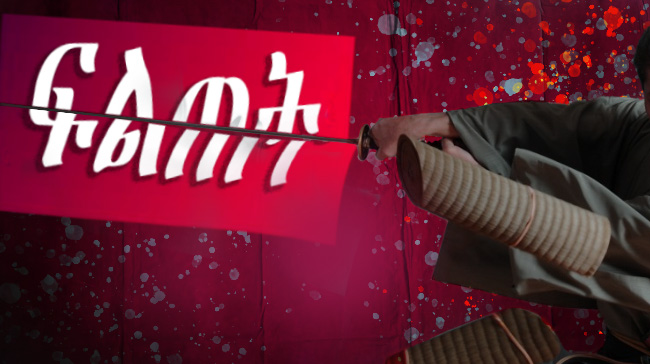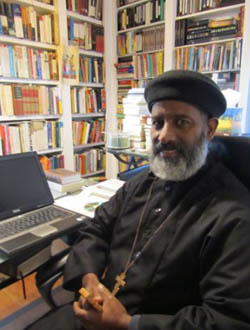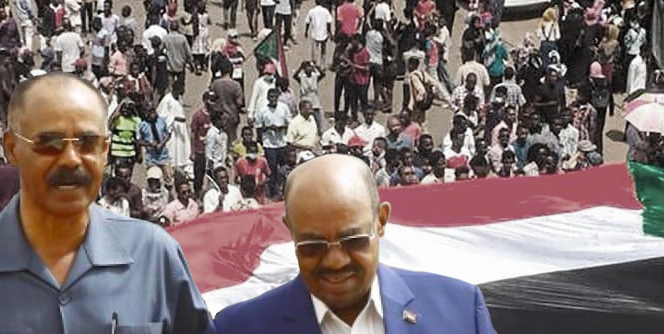Weaponizing Silence, Vulgarizing Languages

(Editor’s note: this article was first published on July 26, 2023; it’s being republished as a reference.)
When one’s faith in humanity was beginning to wane with the seemingly endless streams of vitriols from social media, intelligently thought-out discussion in a podcast restores that faith quite a bit*. Prior to the podcast, too, Negarit 28,29, and 30** were the much-needed doses of public optics that confronted the vitriols, the desecration of sacred symbols, the ill-suited languages used to dehumanize Eritreans, and much, much more. And in the realms of the written word, a translated book, “እቲ ነብዪ”*** and a unique prose/poem using Tigrinya sayings in awate, “ስቕታ፡ ኣብ ምስላ ኣብ ያታ”**** injected the faith that Eritrea, at long last, may just get it together.
A fable, a new friendship, and an idea one had about notions of silence in Eritrean sociopolitical culture align toward a hopeful story that might just give confidence that Eritrea this time around might inevitably get it right. One of the very first things a writer does when an idea keeps lingering demanding to be written, is start a quick google search to see what has been written on the subject. Meeting individuals is a little like google. The meeting (just like in Google’s case) the first info (the first step of the friendship) session is sought out but for some reason, subsequently, several months pass without any outreach efforts on both sides. Suddenly, for whatever reason, one decides to seek the other out. The meetup that was thought to take a maximum of two hours ends up being six hours. Every word shared is something to be held onto because the woven stories told are so deeply knowledge based it left the desire to know more. In the process of the duration of the conversation, among other things, the exchanging of some reading materials took place. Every book that was recommended not only were they not read by the receiving friend but haven’t even been heard of. On the drive home, silence reigns in leaving one to wallow in thoughts about what had just transpired in the last six hours. Upon arriving home, the leafing through the contents of the books begins in earnest. One book demands attention to be read. Reading through the Preface of the book stops this reader in disbelief because every paragraph in it seems to connect to the notions of silence as a strategy in a war; the book delves far deeper and more nuanced ways than was thought possible. Suddenly, the weaponization of silence, the vulgarity, the vitriol, the endless verbal assaults that have been heard in the social media as though they were meant for public consumption, found a context in which to process in a comprehensive way. The Preface in Reid’s (2020) Shallow Graves…illuminates it all in how violence and incessant wars can be consequential to a wellbeing of a society at large.
“Violence is omnipresent… in different ways and in different contexts…in the war itself, its aftermath [,] and its interpretation; the implications of prolonged violence and the shadows it throws across social, cultural and political landscapes; the epistemological repercussions of violence, both local and global; the emotional responses to it. Violence has the most profound impact on ideas about time and history, obviously enough; it fractures time and distorts its perception, stretches, and shrinks it, disrupts the plane of vision, and, again, this is largely owing to the deep emotion it produces. Emotion, too, is the heart of this— particularly melancholy, anger, powerful feelings of discontentedness. These kinds of emotion are temporal and historical by their very nature; they are backward- looking, rooted in a sense of the past, and of time itself and its passage, and its distortion” (Reid, 2020, pp. xxviii-xxix)
So, the stars appear to align perfectly for the wherewithal to write, the only thing needed is a comfortable chair and fingers on the keyboard to write to heart’s content. The quote above is from one of the books recommended by the new friend, “The shallow grave…” Google couldn’t possibly have unearthed. What it unearthed, however, was an article titled, “Eritrea’s War of Silence”, the lens the author used was an unambiguous TPLF-Centered. Leaving the author’s biases aside, the neutral part states, “The war in Tigray, Ethiopia, is fought using words and silences as well as bullets and bombs. The warring parties have different strategies. Eritrea’s strategy is silence” (De Waal, 2021). The interest of this current article, however, explores the much-nuanced type of silence that a State uses, the type that destroys the sociopolitical fabric of a society creating and developing a traumatized generation. Reid’s (2020) “The shallow grave…” is, indeed, central to this, the Preface of the book alone will more than suffice for the article at hand. The violence, the trauma, and the sheer vulgarity in language that comes laced in the weaponization of silence as a state security apparatus is on display in the public sphere. In the mainland, however, one can never be certain if the seemingly polite society that exists in Eritrea now is biding its time to explode later as Reid’s quote above asserts in how violence “…fractures time and distorts its perception, stretches and shrinks it, disrupts the plane of vision, and, again, this is largely owing to the deep emotion it produces.” Eritrea is not out of the woods yet as far as how the weaponization of silence will have impacted our society, which will become apparent when the system of governance changes from the prevailing one that has muffled, sealed, and silenced so the screaming is self-regulated and self-directed to remain within the embodiment of individual citizens. In other words, the public may have found a way of acclimating to the trauma and violence and found a way of absorbing it, inhaling it, waiting to be exhaled in due course. While the mainland’s situation remains to be seen, what’s visibly on display for us to examine is the state of those who have been exiled and are now safely tucked in the West, but the violated and the traumatized body is now finding an outlet by exhibiting it in various forms through vulgarity of language through perfidious lips on social media, as well now through violent means on the streets of Europe.
The Fable: The Father, The Boy and the The Nails in the Fence
A father wanting to impart life’s lesson in the importance of anger management hands a child a hammer and a bag of nails and tells the child to put a nail in the fence every time he loses his temper. Problematizing notions of silence in Eritrean politics, tradition, culture, as it were, in its various forms to perhaps find a deeper meaning than the perfunctory, surface level treatment, is a little like in the fable that a parent is trying to impart a life lesson in his child. Is it possible to unshackle the toxic discursive elements from our discourses that may seem a winning formula in one context and a detrimental one in many other ways. The timing now feels ripe to start disentangling from the corrosive nature of sociopolitical discourse that is on display across the social media platforms. So, the fable continues, after hammering several nails into the fence, the child realizes it is easier to control his temper than putting the 37 nails he had nailed into the fence. So, the nailing began to diminish as the temper tantrum episodes started to decrease. Finally, the child triumphantly comes to his dad and tells him, “Today I didn’t need to put a nail in the fence!” The father, encouraged by the results, takes the child to the fence, and tells him. “Now, every time you don’t lose your temper, pull a nail out.” So, the child found it easy to do without a failure. He pulled all the nails from the fence. And so, the child informs the father he was done pulling the nails out of the fence. There comes the lesson: The father pointing to the holes that the nails left behind said to the child, “The fence will never be the same.” And continues to hammer the point home, “When you say things in anger, they leave a scar just like this one. You can put a knife in a man and draw it out. It won’t matter how many times you say I’m sorry, the wound is still there.”
Too many wars have been fought in the name of Eritreans and Eritrea. This recent one we ought to all demand becomes “the war that ended all wars” and the war that ended all state authorized silences upon Eritrean citizens, forced silences that have done more damage than we are capable imagining. Eritrea must start the inevitable trajectory of transparency, rule of law and “a new birth of freedom and a government of the people, for the people, by the people.”
References:
Author, A. A. (year). Title of the book (Translator first initial, last name, Trans.). Publisher. (Original work published Year).
*If time disfavors, starting at 45 minute-mark to the end delves straight on the subject of this article: https://www.youtube.com/watch?v=FnGO_5Zumxk
**Negarit 228: https://www.youtube.com/watch?v=E6ZdoQMbKgY;
Negarit 229:https://www.youtube.com/watch?v=SA29tk-gIDY;
Negarit 230: https://www.youtube.com/watch?v=XE1NQgyAKrY
*** Gerima, Z. (2023). እቲ ነብዪ (Trans. By Z. Germia Trans.). Semayat Publishing. Original book written by Kahlil Gibran: The Prophet (1923).
****Haile, S. (2023). “ስቕታ፡ ኣብ ምስላ ኣብ ያታ. Awate.com: Published on 23 July 2023.
Reid, R. (2020) Shallow Graves: A Memoir of the Ethiopia-Eritrea War. Londong: Hurst Publishers.
De Waal, A. (2021). Eritrea’s Silent War. HTTPS://SITES.TUFTS.EDU/REINVENTINGPEACE/2021/02/19/ERITREAS-SILENT-WAR/
https://ripplekindness.org/nails-in-the-fence/
https://www.abrahamlincolnonline.org/lincoln/speeches/gettysburg.htm




Awate Forum